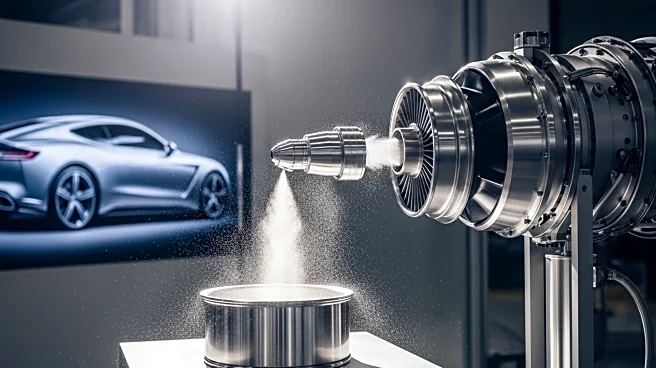What's Happening?
The global atomizing metal powder market is anticipated to grow significantly, reaching a valuation of $5.53 billion by 2031, according to Kings Research. The market, valued at $3.46 billion in 2023, is expected to expand at a compound annual growth rate (CAGR) of 6.12% over the forecast period. This growth is largely driven by the increasing use of atomized metal powders in industries such as aerospace, additive manufacturing, and automotive. Atomized metal powders are produced through processes like gas, water, or plasma atomization, which rapidly cool molten metal into fine particles. These powders are essential for applications requiring precision, durability, and high performance, such as additive manufacturing, powder metallurgy, and thermal spray coatings.
Why It's Important?
The expansion of the atomizing metal powder market is significant for several key industries in the U.S., including aerospace and automotive, which are major consumers of high-performance materials. The demand for lightweight and durable materials is increasing as these industries strive to improve fuel efficiency and meet environmental regulations. Additionally, advancements in atomization technologies are enabling the production of finer, purer metal powders, which are crucial for precision engineering and medical applications. The growth of this market also presents opportunities for cost savings and efficiency gains, as localized production facilities reduce transportation costs and lead times.
What's Next?
The continued growth of the atomizing metal powder market is likely to lead to further advancements in atomization technologies, enabling the production of even higher quality powders. This could enhance manufacturing efficiency and support innovation in product development across various industries. As the market expands, companies may pursue strategic acquisitions, partnerships, and product launches to strengthen their competitive position. Additionally, the establishment of production facilities in regions like Asia-Pacific could make high-quality powders more accessible globally, supporting industrial adoption in aerospace, automotive, and healthcare sectors.
Beyond the Headlines
The growth of the atomizing metal powder market may have broader implications for global manufacturing practices, particularly in terms of sustainability and environmental impact. The shift towards lightweight materials in the automotive industry, for example, could contribute to reduced emissions and improved fuel efficiency. Furthermore, the development of advanced materials could foster innovation in various sectors, enhancing customer and employee experiences. As the market evolves, companies will need to navigate compliance and risk mitigation challenges to ensure that their products meet industry standards and regulations.











